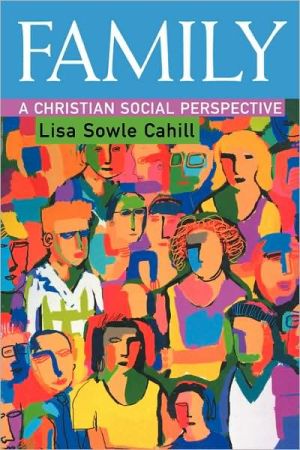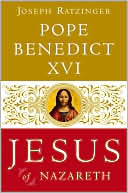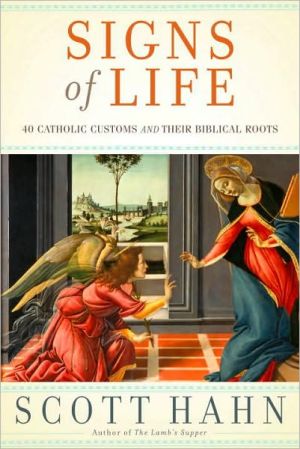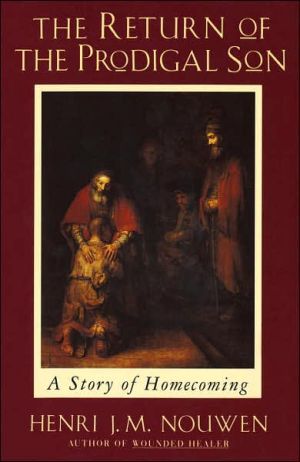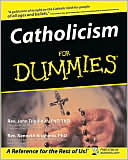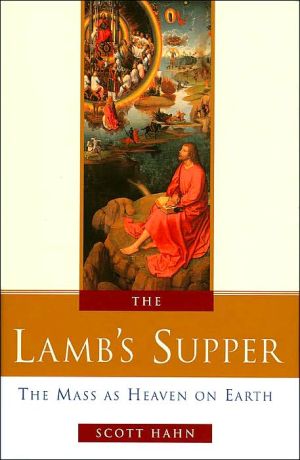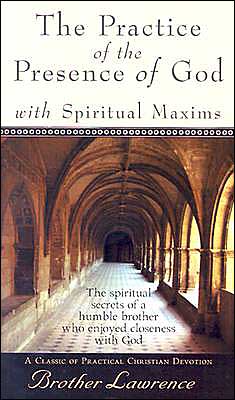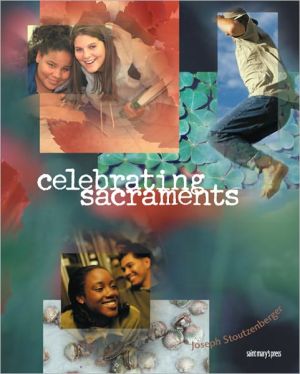Family: A Christian Social Perspective
An authentic vision for today's family\ Thoughtful and informative, Cahill's work brings fresh historical, theological, and ethical thought to the explosive area of family-deeply contested territory in today's cultural and religious skirmishes. As one group of social theorists and cultural critics points to rising divorce and illegitimacy rates as symptoms of unfettered individualism and moral laxity, another side notes that the "traditional," nuclear family is actually a product of the...
Search in google:
Cahill's important work brings fresh historical, theological, and ethical thought to the explosive area of family-deeply contested territory in today's cultural and religious skirmishes. In the religious arena, evangelical-conservative vs. mainline-feminist lines echo larger social battles, contesting the authentic meaning of family within a Christian framework. Though "family" has been dissected in the academic and cultural wars, Cahill asserts that the usual religious agenda of restoring the traditional nuclear family is actually misinformed and misguided. It bolsters oppressive social, economic, and racial mechanisms that are destroying families at the bottom, middle, and even top of the ladder. Is there an authentically Christian notion of family? Cahill's contribution shows in a striking way how very different were counter-cultural New Testament and early-church notions of family from our ideas of "family values;" how, throughout history, other influential Christian examples have emerged in the work of John Chrysostom, Martin Luther, and the Puritans; how, despite distortion by gender and class divisions, there develops a Christian vision of the altruistic family, animated by Christian discipleship to stand for compassion, generosity, and justice; how pertinent this vision of the "domestic church" is to public debate and public policy. Cahill: "The vocation of Christian families is to embody discipleship, and thereby to work toward transforming civil society. This book looks beyond the petty parochialisms of the family debate and directly into the heart of Christian humanism and discipleship to sight its relevance to the commongood." Author Bio: Lisa Sowle Cahill is J. Donald Monan Professor of Theology, Boston College. She is author of Between the Sexes (Fortress Press 1988), Love Your Enemies (Fortress Press 1994), and Sex, Gender, and Christian Ethics (Cambridge University Press, 1996). Cahill has held leadership posts in both the Society for Christian Ethics and the Catholic Theological Society of America.
From the Preface (pre-publication version):\ What is the Christian family? This is the question that motivates this project. It is a question with a context. During the 1990s, North American social theorists and cultural critics seemed to divide into two schools of thought about families. Both agree that family forms are changing, but they diagnose the causes and results of this phenomenon very differently. On one side are those who pinpoint rising divorce and illegitimacy rates as symptoms of unfettered individualism, narcissism, moral laxity, and hedonism. These vices lie at the root of widespread family disintegration. They are devastating civil society while depleting the "social capital" (important social institutions that promote inclusive social participation and support) that depends on healthy family life and is so necessary to a viable society. Crime and poverty follow in the wake of such trends. Key to their reversal is a renewed ethic of family life built around responsibility, fidelity, and self-sacrifice. \ \ On the other side stand those who view newly pluralistic family forms as a liberation from the patriarchal "nuclear" family, which is in reality not traditional but a product of the industrial revolution, capitalism, and the public-private split. The nuclear, middle-class family is structured according to hierarchically ordered gender roles and owes its economic security to a racially segregated underclass perpetually excluded from economic prosperity. Diversity in families is a welcome change, and it should not be judged socially or morally inferior. \ \ These opposing camps were vociferous and influential during the 1992 and 1996 U.S. electioncampaigns and continue to be vocal in this century. They have fought for different approaches to family, health care, and welfare policies, and they both try to manipulate cultural symbols to form public consciousness in support of their own agenda. \ \ To oversimplify, religious responses to those two views of the family have tended to break down into evangelical-conservative and mainline-feminist categories, with black churches occupying a complex middle position that will be investigated in this book's first and fifth chapters. The evangelical-conservative and mainline-feminist reactions, however, seem to focus on two different North American experiences of family and to put the problems, successes, and future of one rather than the other at the center of debate and political action. Evangelical Protestants and conservative "pro-life" Roman Catholics focus on the middle-class family, disrupted by new rates of sex and childbearing outside of marriage and by infidelity and divorce in marriage, all of which destabilize the economic base of the nuclear family. That base consists of a male breadwinner providing indirect access to material and social goods for his wife and children. Liberal Protestants and Catholics, on the other hand, especially feminist theologians and churches that are rapidly institutionalizing nontraditional roles for women, focus on families that are outside of or excluded from the social structures that protect the model of family built on the male wage-earner and female domestic support. They are looking for new patterns of access via different family forms, or they have found access within the standard middle-class forms constraining or oppressive. Hence they seek to institutionalize "nontraditional" patterns of family life. A counterpoint to both of these contrasting religious responses, one that will be explored at some length in chapter 5, is found in African American interpreters of family life. Writers from this perspective often acclaim the strengths of black kinship patterns outside the nuclear model and call for socioeconomic reform, even while they seek to enhance marital and parental stability to improve the social position of blacks in our society.\ \ The evangelical-conservative Christian response answers what it defines as the problems of families today by championing strong family relations and bonds, urging sacrifice and altruism within the family. Yet, this approach often fails to provide a socioeconomic critique of internal family relations (especially male-female relations), and of the social positioning of families (especially why economic factors make it impossible for some families to thrive on the nuclear model). The mainline-feminist model typically undertakes a more radical critique of gender, race, class, and sexual orientation as they appear in family forms and social functions, but it, in turn, has difficulty regaining its normative balance around some vision of what is a healthy family or a Christian family. It tears down oppressive forms without building up better ideals of kin-derived, spousal, and parental relationships or of how families serve the common good of society and are served by it. While advocates of the first approach claim that "the Christian family" denotes the monogamous, reproductive pair who sacrifice for the welfare of their children, advocates of the second maintain that the "Christian" values of compassion, love, and inclusion not only prohibit the condemnation of other types of family but demand the acceptance of all families who have been the victims of social injustice. African American authors tend to agree with the latter position while still supporting and encouraging the formation of two-parent families within an extended kin network.\ \ The family is here understood as basically an organized network of socioeconomic and reproductive interdependence and support grounded in biological kinship and marriage. Kinship denotes affiliation through reproductive lines. Marriage in turn is a consensual and contractual manner of uniting kin groups, especially for the purpose of reproduction, and for perpetuation of the kinship structures through which social and economic relations are managed. While modern societies invest affective, interpersonal relationships within the family with primary significance, this has not universally been the case. Moreover, the extended consanguineous family is more ancient and more universal in social importance than the modern so-called nuclear family, consisting of spouses and children and considered to have been formed through marriage. The fact that family is defined primarily in terms of kinship in virtually all cultures signifies the importance of the body and of essential material needs in defining the family and its functions. The fact that marriage, however, is also a way of creating and defining family cross-culturally represents in turn the importance of affiliation through free choice in defining family ties. Both are important elements in understanding and defining family.\ \ Although family as created by kinship and marriage is the most basic family form or definition of family, it is not the only or exclusively legitimate form. It is basic in that it prevails across cultures as an important social institution and provides the fundamental working concept of family for most individuals and societies. There are other types of human alliance, however, for mutual economic and domestic support, as for reproduction and childrearing, that are analogous to the basic kin- and marriage-based family. These need not entail biological kinship or male-female marriage. For instance, forms of adoption are familiar in most societies, though in many cultures adoption of children within the kin group is preferred over adoption of non-kin. The outer boundaries of "family" are thus perhaps impossible to define, since analogous forms arise according to particular circumstances and needs. In any event, it would be imprudent to attempt to set definitive limits on what counts as family, if as I do, one wants to advance an inclusive and supportive approach to family life, one that can hold up ideals such as male-female coparenting and sexual fidelity without thereby berating and excluding single-parent families, divorced families, gay and lesbian families, blended families, or adoptive families. Such family structures are often very worthy and successful adaptations to particular circumstances and, given appropriate support, can fulfill family functions as well as more traditional families. As I hope to show, the ideals of Christian family life should focus more on function (fostering gospel-informed commitments and behavior) than on regularity of form.\ \ My thesis is that strong family, spousal, and parental relationships are important, but that these very ideals are undermined by condemnatory and punitive attitudes and policies toward nonconforming families.
Preface 1. Families, Christian Ethics, and Civil Society -The Family as Church -The Family and Civil Society -Conclusions: Three Convictions 2. Family Bonds and Christian Community: New Testament Sources -Family and Society in the First-Century Mediterranean World -The Jewish Context -Jesus and Families -The New Family of Believers -Divorce Sayings -House Churches -The Evolving Christian Family -Household Codes -Christian Ritual Sacrifice -Conclusions: Christian Identity's Implications for the Family 3. Family as Church: Three Historical Representations -John Chrysostom -Martin Luther -The Puritans -Conclusions: Christian Views of Family and Children 4. "Domestic Church": Families and the Common Good -The Domestic Church Metaphor -Recent Catholic Themes -Family and Catholic Social Teaching -John Paul II and Families -The Practicality of the Message and a Grassroots Response -Families, Welfare, and the Bishops' Response -Catholicism, Economics, and Families 5. Lessons from African American Families -An Important Perspective -Some History -Current Factors -Community Solutions -Black Church, Domestic Church -Racial Equality, Civil Society, and Catholic Social Teaching -Conclusions: Learning from African American Families 6. A Christian Family Vision -Ecumenical Christian Commitment to Families Today -A Program for Christian Families Notes Index
